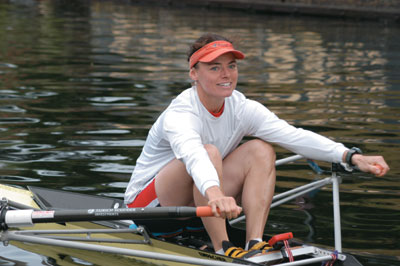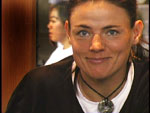Medical School Graduate Rows in 2004 Olympic Games
Going through medical school is no easy task, nor is training for the Olympic games. But Jennifer Devine found a way to do both at the same time. Devine is both a qualifying Olympian in single sculls rowing and a 2003 graduate of the UW School of Medicine.
Devine began rowing during her undergraduate days at the UW. Standing 5 feet 7 inches tall, Devine was told she was too short to join the organized team, so she picked rowing up as an intramural activity. Little did she know her desire for an extracurricular activity would take her to several elite-level rowing competitions.

Dr. Jennifer Devine took up sculling on Seattle's Lake Washington as an undergraduate extracurricular activity.
In 1996 Devine qualified for the summer Olympics in Atlanta to row in the double sculls event. After finishing ninth in the world, she took some time off from the sport and from school. During that time she moved back to her hometown of Portland, Ore., to care for her ailing father.
In 1999 Devine returned to the UW to begin her first year of medical school. She continued her athletic training throughout her medical school years. She found that it provided a nice distraction from the pressures that come with being a student.
"I tried not to do both at the highest level at the same time because that is very difficult," Devine said. "But in many ways the two actually complement each other. Athletic training definitely helped me during medical school to maintain a level of sanity, personal satisfaction, and stress reduction."
Devine decided to switch to the single sculls event because her schedule was too hectic to keep a training partner. Although Devine's quest is not completely unheard of, it's not commonplace among medical school graduates. Her peers sometimes find it hard to believe that she is able to take on such a pursuit.
"A lot of us in medicine haven't spent a lot of time, at least at this stage of the game, being very intense about anything besides academics," Devine said. "Although it's not something that the people who I work with won't understand if I explain it to them, it's not necessarily something that intuitively comes with the territory."
Devine has received a vast amount of support during her training from her peers in both the rowing and medical communities.
"I like to think of myself of being on a big team even though I am just a single sculler," Devine said. "My job on this team is to drive the boat. People have helped in a lot of magical and great ways."
In the spring of 2004 Devine trained hard to make a return trip to the Olympic games. The last time Devine competed on the elite level was in 2001 between her second and third year of medical school, when she finished seventh in the world. In 2004 Devine was the U.S. Olympic trials champion. She qualified for the summer games by winning the Olympic Qualification Regatta in Lucerne, Switzerland in June.
In Athens, Devine finished second in her opening round heat, right behind defending world champion Ekaterina Karsten of Belarus. She then took second place in her repechage, qualifying her for the top semifinal. Devine finished fourth in the semifinal, narrowly missing the medal round. In the second-tier final round, which determined seventh through 12th place, she finished third, earning her ninth place overall.
After returning from Athens, Devine began an internship with the UW Department of Internal Medicine. Following this preliminary year of training she will move to Boston to begin her residency in physical rehabilitation medicine at the Spaulding Hospital, which is associated with Harvard Medical School.
"It will be a tough move," Devine said. "I love Seattle, and I've been here for a long time."
Devine hopes the years she has spent as an elite level athlete will help her have a better understanding of her patients' needs.
"I'd like to think that in the field of rehabilitation medicine, having the experiences that I have gotten this year through training and interacting with various people in high level athletics will help me professionally," Devine said, "both in the field and in terms of simply dealing with patients. That's the next direction and frankly, I'm looking forward to it."

Watch a video interview with Dr. Jennifer Devine and see her train for the Olympic Games.